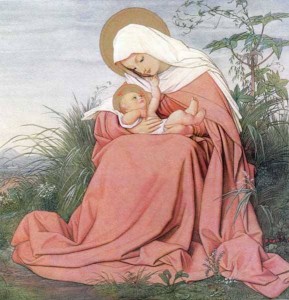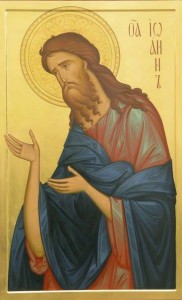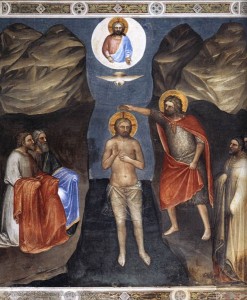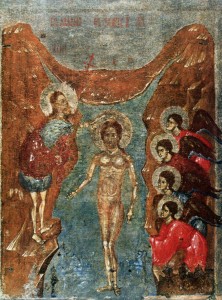 Today, the Church celebrating the Mass according to the Missal of Paul VI observes the feast of the Baptism of the Lord. In the Extraordinary Form of the Mass (Missal of Blessed John XXIII) this feast is celebrated on January 13, 2014. Also, in the Ordinary Form, the Christmas season comes to an end today (in the EF of the Liturgy Christmastide continues until the Presentation of the Lord –Candlemas).
Today, the Church celebrating the Mass according to the Missal of Paul VI observes the feast of the Baptism of the Lord. In the Extraordinary Form of the Mass (Missal of Blessed John XXIII) this feast is celebrated on January 13, 2014. Also, in the Ordinary Form, the Christmas season comes to an end today (in the EF of the Liturgy Christmastide continues until the Presentation of the Lord –Candlemas).
The Introit antiphon for this Sunday reads, Behold the Lord the Ruler is come: and the Kingdom is in His Hand, and power, and dominion. — (Ps. 71. 2) Give to the king Thy judgment, O God: and to the king’s Son Thy justice.
****Scott Hahn has a teaching here; be sure to listen to Scott’s presentation (it’s only 3 min.).
In 2000, Pope John Paul had this to say about what we celebrate in the Liturgy today:
On the holy night in Bethlehem, Jesus was born among us in the poverty of a stable; on the day of Epiphany, the Magi acknowledged him as the long-awaited Messiah of the nations; today, all our attention is focused on his person and mission. The Father speaks to him directly: “You are my beloved Son,” as the heavens are opened and the Spirit descends on him in the form of a dove (cf. Mk 1: 10-10). The scene on the banks of the Jordan thus presents the solemn proclamation of Jesus as the Son of God. And so his saving mission begins publicly.
The Baptism that the Lord receives takes place in the context of John the Baptist’s penitential preaching. The ritual act of being immersed in water, offered by the Precursor, was an outward sign of repentance for sins committed and of the desire for spiritual renewal.
All this refers to the Christian sacrament of Baptism, which I will shortly have the joy of administering to these children and which we received a long time ago. Baptism inserted us into God’s own life, making us his adopted children in his only-begotten “beloved Son.”
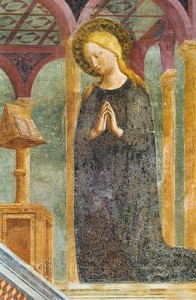 Finally we arrive at the Fourth Sunday of Advent. The final Sunday is dedicated to the Motherhood of the Blessed Virgin. The opening prayer at Mass is the prayer used for Angelus. The Church, pointing to Mary points to the Savior.
Finally we arrive at the Fourth Sunday of Advent. The final Sunday is dedicated to the Motherhood of the Blessed Virgin. The opening prayer at Mass is the prayer used for Angelus. The Church, pointing to Mary points to the Savior.